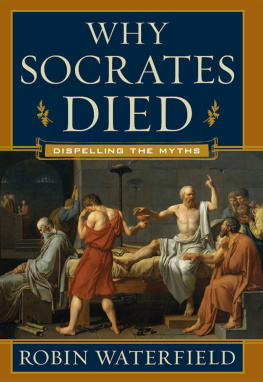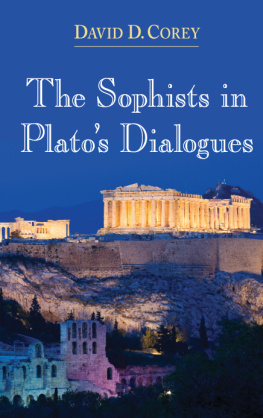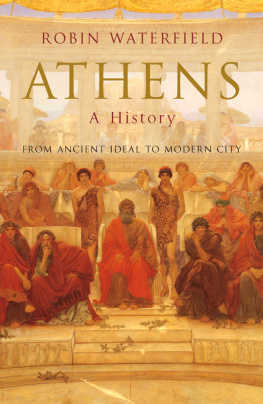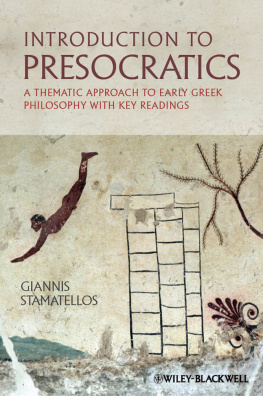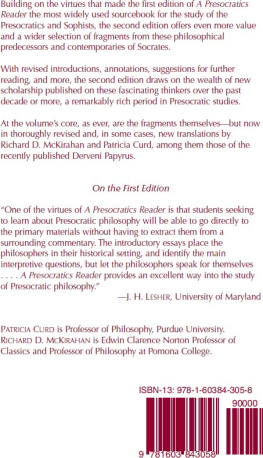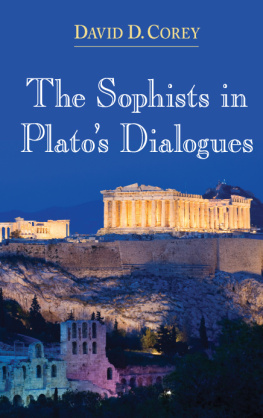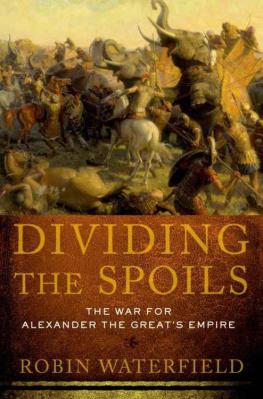Waterfield - The first philosophers: the presocratics and sophists
Here you can read online Waterfield - The first philosophers: the presocratics and sophists full text of the book (entire story) in english for free. Download pdf and epub, get meaning, cover and reviews about this ebook. City: UK;Oxford, year: 2009;2000, publisher: Oxford University Press, genre: Religion. Description of the work, (preface) as well as reviews are available. Best literature library LitArk.com created for fans of good reading and offers a wide selection of genres:
Romance novel
Science fiction
Adventure
Detective
Science
History
Home and family
Prose
Art
Politics
Computer
Non-fiction
Religion
Business
Children
Humor
Choose a favorite category and find really read worthwhile books. Enjoy immersion in the world of imagination, feel the emotions of the characters or learn something new for yourself, make an fascinating discovery.

- Book:The first philosophers: the presocratics and sophists
- Author:
- Publisher:Oxford University Press
- Genre:
- Year:2009;2000
- City:UK;Oxford
- Rating:5 / 5
- Favourites:Add to favourites
- Your mark:
- 100
- 1
- 2
- 3
- 4
- 5
The first philosophers: the presocratics and sophists: summary, description and annotation
We offer to read an annotation, description, summary or preface (depends on what the author of the book "The first philosophers: the presocratics and sophists" wrote himself). If you haven't found the necessary information about the book — write in the comments, we will try to find it.
Waterfield: author's other books
Who wrote The first philosophers: the presocratics and sophists? Find out the surname, the name of the author of the book and a list of all author's works by series.
The first philosophers: the presocratics and sophists — read online for free the complete book (whole text) full work
Below is the text of the book, divided by pages. System saving the place of the last page read, allows you to conveniently read the book "The first philosophers: the presocratics and sophists" online for free, without having to search again every time where you left off. Put a bookmark, and you can go to the page where you finished reading at any time.
Font size:
Interval:
Bookmark:
OXFORD WORLDS CLASSICS
THE FIRST PHILOSOPHERS
THE PRESOCRATICS were philosophers and scientists who lived and worked in various cities throughout the ancient Greek world, from southern Italy and Sicily to the coast of the Black Sea, from the beginning of the sixth century BCE to the time of Socrates in the late fifth century. Among a number of lesser names, some fifteen major thinkers stand out in this period. Though their work survives only in fragments and in reports from later writers, who were often unsympathetic, as well as far removed in time, enough remains for us to be able to effect a reconstruction with some degree of plausibility, and thus to see that they formed the foundations of Western scientific and philosophical thought. Most of them wrote in prose, and indeed they were among the first prose writers in the West, helping to develop the genre; but some kept to the traditional didactic medium of verse.
THE SOPHISTS were itinerant teachers and writers, dating chiefly from the fifth century BCE. Though they lectured and taught throughout the Greek world, they achieved the most recognition in Athens, which at the time was the centre of culture in Greece. Very little of their original prose survives, and we are largely dependent upon the reports of others, who were often hostile to their enterprise, and upon reflections of their work in contemporary historians, dramatists, and orators. As well as initiating a revolution in education, by offering what was effectively the first Western attempt at higher education, they also made important strides in social, ethical, and political philosophy, and we can now see that the pejorative use of the term Sophist, which stems from Plato and Aristotle, is rarely deserved.
ROBIN WATERFIELD was born in 1952. After graduating from Manchester University, he went on to research ancient Greek philosophy at Kings College, Cambridge. He has been a university lecturer (at Newcastle upon Tyne and St Andrews), and an editor and publisher. Currently, however, he is a self-employed writer, whose books range from philosophy to childrens fiction. He has previously translated, for Oxford Worlds Classics, Platos Republic, Symposium, and Gorgias, Aristotles Physics, Herodotus Histories, and Plutarchs Greek Lives and Roman Lives.
OXFORD WORLDS CLASSICS
For over 100 years Oxford Worlds Classics have brought readers closer to the worlds great literature. Now with over 700 titlesfrom the 4,000-year-old myths of Mesopotamia to the twentieth centurys greatest novelsthe series makes available lesser-known as well as celebrated writing.
The pocket-sized hardbacks of the early years contained introductions by Virginia Woolf, T. S. Eliot, Graham Greene, and other literary figures which enriched the experience of reading. Today the series is recognized for its fine scholarship and reliability in texts that span world literature, drama and poetry, religion, philosophy and politics. Each edition includes perceptive commentary and essential background information to meet the changing needs of readers.
Refer to the to navigate through the material in this Oxford Worlds Classics ebook. Use the asterisks (*) throughout the text to access the hyperlinked Explanatory Notes.
OXFORD WORLDS CLASSICS

The Presocratics and Sophists

Translated with commentary by
ROBIN WATERFIELD


Great Clarendon Street, Oxford OX2 6DP
Oxford University Press is a department of the University of Oxford.
It furthers the UniversityS objective of excellence in research, scholarship,
and education by publishing worldwide in
Oxford New York
Auckland Bangkok Buenos Aires Cape Town Chennai
Dar es Salaam Delhi Hong Kong Istanbul Karachi Kolkata
Kuala Lumpur Madrid Melbourne Mexico City Mumbai Nairobi
So Paulo Shanghai Taipei Tokyo Toronto
Oxford is a registered trade mark of Oxford University Press
in the UK and in certain other countries
Published in the United States
by Oxford University Press Inc., New York
Robin Waterfield 2000
The moral rights of the author have been asserted
Database right Oxford University Press (maker)
First published as an Oxford WorldS Classics paperback 2000
All rights reserved. No part of this publication may be reproduced, stored in a retrieval system, or transmitted, in any form or by any means, without the prior permission in writing of Oxford University Press, or as expressly permitted by law, or under terms agreed with the appropriate reprographics rights organizations. Enquiries concerning reproduction outside the scope of the above should be sent to the Rights Department, Oxford University Press, at the address above
You must not circulate this book in any other binding or cover
and you must impose this same condition on any acquirer
British Library Cataloguing in Publication Data
Data available
Library of Congress Cataloging in Publication Data
Data available
ISBN 0192824546
3 5 7 9 10 8 6 4
Typeset in Ehrhardt
by RefineCatch Limited, Bungay, Suffolk
Printed in Great Britain by
Clays Ltd, St Ives plc
To the memory of
George Kerferd and Trevor Saunders
So much of our information about the Presocratic philosophers and the Sophists is fragmentary or otherwise obscure that the temptation was to write a book in which the amount of commentary outweighed the amount of translated material. I have resisted this temptation. After a short introduction, each thinker has been allowed to speak as much as possible for himself, or, failing that, at least to be heard, however faintly at times, through the work of ancient commentators. There is a great deal of secondary ancient material, especially about the Presocratics, whose importance was generally recognized in ancient times. It is therefore well beyond the scope of a book such as this to hope for completeness. Rather, my policy has been to translate the majority of the actual fragments themselves, and a small proportion of the ancient testimonia, concentrating on those passages which are both important and relatively clear in their own right (so as to continue to let the thinkers speak for themselves as much as possible), and which seem to me to be relatively faithful to the original thinker or at least to make it plain that they are distorting him, and how they are doing so.
A few scholars are perhaps over-pessimistic about our chances of recovering the thought of the Presocratics and Sophists. In some cases we have enough genuine fragments to test the validity of the secondary testimonia; in some cases the material surrounding shorter fragments can cast light on the original context. Nevertheless, there is an immense amount of discussion among modern scholars about what each of these thinkers really thought. Naturally, scholars prefer to rely as much as possible on the actual fragments themselves, but in the case of none of these first Western philosophers are there ever quite enough of these for us to be able to see the whole picture. But that is the necessary policy of this book, and in order to keep to it I have appended longer bibliographies than a volume like this might usually warrant. In the case of the Presocratics and Sophists reference to modern works is indispensable, since many readers will want further guidance. However, let me urge readers to start studying these thinkers simply by thinking for themselves about what any of them might have been meaning. For all the scholarly work that has gone into the area, there is little consensus: your own ideas, based firmly on the available evidence as presented in this book, are as good a way into the thought of the first philosophers as those of the most eminent of academic scholars.
Next pageFont size:
Interval:
Bookmark:
Similar books «The first philosophers: the presocratics and sophists»
Look at similar books to The first philosophers: the presocratics and sophists. We have selected literature similar in name and meaning in the hope of providing readers with more options to find new, interesting, not yet read works.
Discussion, reviews of the book The first philosophers: the presocratics and sophists and just readers' own opinions. Leave your comments, write what you think about the work, its meaning or the main characters. Specify what exactly you liked and what you didn't like, and why you think so.

